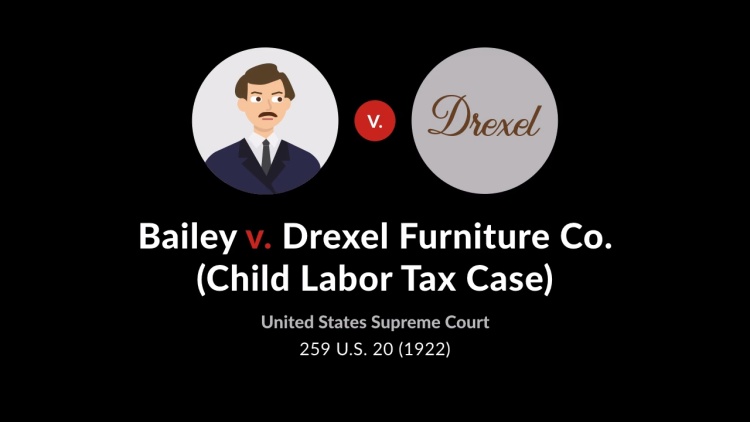Child Labor Tax Case (Bailey v. Drexel Furniture Co.)
United States Supreme Court
259 U.S. 20 (1922)
- Written by Megan Petersen, JD
Facts
In 1919, Congress passed the Child Labor Tax Law, which constituted a 10 percent tax on the profits of any company using child labor. The law defined child labor as the use of minors “under the age of sixteen in any mine or quarry, and under the age of fourteen in any mill, cannery, workshop, factory, or manufacturing establishment.” Additionally, the definition applied to the use of children in these age ranges for more than eight hours a day or six days a week, or during certain evening hours. Drexel Furniture Co. (plaintiff) brought suit in federal district court against Bailey (defendant). Drexel challenged the law on the ground that it was an unconstitutional attempt by the federal government to regulate child labor in the states—a function exclusively reserved to the states under the Tenth Amendment to the Constitution. The district court held the law unconstitutional, and the court of appeals affirmed. The United States Supreme Court granted certiorari.
Rule of Law
Issue
Holding and Reasoning (Taft, C.J.)
What to do next…
Here's why 907,000 law students have relied on our case briefs:
- Written by law professors and practitioners, not other law students. 47,100 briefs, keyed to 996 casebooks. Top-notch customer support.
- The right amount of information, includes the facts, issues, rule of law, holding and reasoning, and any concurrences and dissents.
- Access in your classes, works on your mobile and tablet. Massive library of related video lessons and high quality multiple-choice questions.
- Easy to use, uniform format for every case brief. Written in plain English, not in legalese. Our briefs summarize and simplify; they don’t just repeat the court’s language.





